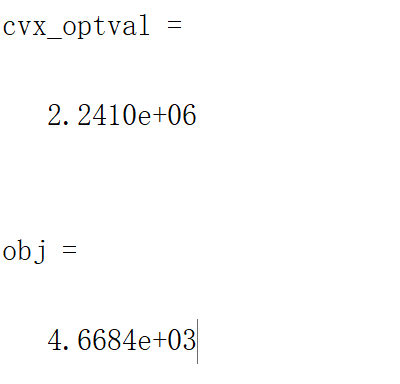hello, I meet one problem when using the CVX toolbox. The cvx_optval unequal to the object value which is using the value of the optimization variable obtained by CVX.
My matlab code is as follows:

clc
clear
N=20;
T_bar=20;
dt=1/N;
q0=[0;0;20];
qf=[20;20;40];
w=[15;5;0];
H_min=10;
c0=0.036;
c1=0.0075;
c2=8.5938 * 1e-6;
c3=8.8949 * 1e-7;
c4=5.1287 * 1e-10;
Pc=5;
u_max=640;
u_min=350;
delta=[5;5;5;10;10;10;0.5;0.5;0.5;0.5;0.5;0.5];
x0=[q0;1;1;1;0;0;0;0;0;0];
x_bar=zeros(12,N);
u_bar=zeros(4,N-1);
u_bar(:,:)=500;
V0=1;
Vmax=2;
x_bar(:,1)=x0;
for n=1:N-1
x_bar(1:3,n+1)=x_bar(1:3,n)+V0 * T_bar * dt;
end
x_bar(4:6,2:N)=V0T_bardt;
%communication condition
Qk=50;
gamma=1e5;
E_cur=2fun_E(u_bar,T_bardt);
m=0;
Ju=zeros(1,4*(N-1));
dist=(x_bar(1,1:end-1)-w(1)).^2+(x_bar(2,1:end-1)-w(2)).^2+(x_bar(3,1:end-1)-w(3)).^2;
Alpha=log2(1+gamma./dist);
Beta=log2(exp(1))gamma./((dist+gamma) . * dist);
A_cur=sqrt(T_bardtAlpha);
for n=1:N-1
Ju(1,4n-3:4n)=fun_dJdu(u_bar(:,n),T_bardt);
end
P_bar=fun_dJdt(u_bar,dt);
cvx_clear
cvx_begin
cvx_quiet(true);
variable u(4,N-1)
variable x(12,N)
variable A_bar(1,N-1)
variable T
minimize (T_bardt(sum(sum(c4pow_abs(u,4)+c3pow_abs(u,3)+c2pow_abs(u,2)+c1u+c0))))
subject to
T>=5;
T<=40;
abs(T-T_bar)<=5;
u<=u_max;
u>=u_min;
abs(u(2,:)-u(4,:))<=5;
abs(u(1,:)-u(3,:))<=5;
x(:,1)==x0;
for n=1:N-1
f_bar=UAV_func(x_bar(:,n),u_bar(:,n),T_bar,dt);
A=UAV_dfdx(x_bar(:,n),u_bar(:,n),T_bar,dt);
B=UAV_dfdu(x_bar(:,n),u_bar(:,n),T_bar,dt);
C=UAV_dfdz(x_bar(:,n),u_bar(:,n),T_bar,dt);
abs(x(:,n)-x_bar(:,n))<=deltaT_bardt;
x(:,n+1)==x(:,n)+f_bar+A*(x(:,n)-x_bar(:,n))+B*(u(:,n)-u_bar(:,n))+…
C*(T-T_bar);
x(3,n)>=H_min;
end
for n=1:N-1
quad_over_lin(A_bar(n),Tdt)<=Alpha(n)-Beta(n)(pow_pos(norm(x(1:3,n)-w),2)-dist(n));
end
sum(A_cur.^2+2A_cur.(A_bar-A_cur))>=Qk;
x(1:3,N)==qf;
cvx_end
cvx_optval
obj=(T_bardt(sum(sum(c4pow_abs(u,4)+c3pow_abs(u,3)+c2pow_abs(u,2)+c1u+c0))))
%the cvx_optval unequal to obj. Why?
%%%%%%%Best wish you can help me!